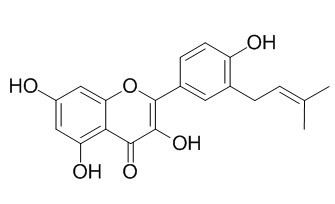Isolicoflavonol
Isolicoflavonol is a potential cancer chemopreventive agent.
Inquire / Order:
manager@chemfaces.com
Technical Inquiries:
service@chemfaces.com
Tel:
+86-27-84237783
Fax:
+86-27-84254680
Address:
1 Building, No. 83, CheCheng Rd., Wuhan Economic and Technological Development Zone, Wuhan, Hubei 430056, PRC
Providing storage is as stated on the product vial and the vial is kept tightly sealed, the product can be stored for up to
24 months(2-8C).
Wherever possible, you should prepare and use solutions on the same day. However, if you need to make up stock solutions in advance, we recommend that you store the solution as aliquots in tightly sealed vials at -20C. Generally, these will be useable for up to two weeks. Before use, and prior to opening the vial we recommend that you allow your product to equilibrate to room temperature for at least 1 hour.
Need more advice on solubility, usage and handling? Please email to: service@chemfaces.com
The packaging of the product may have turned upside down during transportation, resulting in the natural compounds adhering to the neck or cap of the vial. take the vial out of its packaging and gently shake to let the compounds fall to the bottom of the vial. for liquid products, centrifuge at 200-500 RPM to gather the liquid at the bottom of the vial. try to avoid loss or contamination during handling.
J Cell Mol Med.2021, 25(5):2645-2654.
J Integr Plant Biol.2023, 13564.
Biochem Biophys Res Commun.2018, 495(1):1271-1277
Int Immunopharmacol.2020, 90:107268.
Industrial Crops and Products2018, 353-362
Curr Issues Mol Biol.2023, ;45(2):1601-1612.
Tropical J. of Pha. Research2017, 16(3):543-552
Life Sci.2022, 298:120488.
BMC Plant Biol.2023, 23(1):239.
Eur J Pharmacol.2023, 960:176121.
Related and Featured Products
Planta Med. 2004 Aug;70(8):691-705.
Natural inhibitors of carcinogenesis.[Pubmed:
15326546 ]
Previous collaborative work by our group has led to the discovery of several plant isolates and derivatives with activities in in vivo models of cancer chemoprevention, including deguelin, resveratrol, bruceantin, brassinin, 4'-bromoflavone, and oxomate.
METHODS AND RESULTS:
Using a panel of in vitro bioassays to monitor chromatographic fractionation, a diverse group of plant secondary metabolites has been identified as potential cancer chemopreventive agents from mainly edible plants. Nearly 50 new compounds have been isolated as bioactive principles in one or more in vitro bioassays in work performed over the last five years. Included among these new active compounds are alkaloids, flavonoids, stilbenoids, and withanolides, as well as a novel stilbenolignan and the first representatives of the norwithanolides, which have a 27-carbon atom skeleton. In addition, over 100 active compounds of previously known structure have been obtained. Based on this large pool of potential cancer chemopreventive compounds, structure-activity relationships are discussed in terms of the quinone reductase induction ability of flavonoids and withanolides and the cyclooxygenase-1 and -2 inhibitory activities of flavanones, flavones and stilbenoids. Several of the bioactive compounds were found to be active when evaluated in a mouse mammary organ culture assay, when used as a secondary discriminator in our work.
CONCLUSIONS:
The compounds (2 S)-abyssinone II, (2 S)-2',4'-dihydroxy-2"-(1-hydroxy-1-methylethyl)dihydrofuro[2,3- h]-flavanone, 3'-[gamma-hydroxymethyl-( E)-gamma-methylallyl]-2,4,2',4'-tetrahydroxychalcone 11'- O-coumarate, Isolicoflavonol, isoliquiritigenin, and ixocarpalactone A are regarded as promising leads as potential cancer chemopreventive agents.
Pharmacogn Mag. 2014 Oct;10(40):497-502.
Preliminary identification of the absorbed bioactive components and metabolites in rat plasma after oral administration of Shaoyao-Gancao decoction by ultra-performance liquid chromatography with electrospray ionization tandem mass spectrometry.[Pubmed:
25422552]
Shaoyao-Gancao decoction (SGD), a traditional Chinese medicine formula, has been used for the treatment of abdominal pain and dysmenorrhea disease in Asia over long period of time. Its effectiveness has been confirmed in clinic, but its active constituents remain unclear.
METHODS AND RESULTS:
In this paper, a rapid, sensitive and reliable ultra-performance liquid chromatography-electrospray ionization/quadrupole-time-of-flight high-definition mass spectrometry (UPLC-ESI-Q-TOF-MS) in positive and negative ion mode were established to characterize the active constituents of SGD in vitro. The analysis was performed on a Waters UPLCTM HSS T3 (2.1 × 100 mm, 1.8 µm) using gradient elution system. Automated MetaboLynxTM technique was employed to screen for the potentially bioactive components in rat plasma after oral administration of SGD. MS/MS fragmentation behavior was proposed for aiding the structural identification of the components.
Based on the developed method of fingerprint analysis, an injection run of the plasma sample was finished in 15.0 min. A total of 12 compounds including 9 prototype components such as gallicacid, albiflorin, liquiritin, pallidiflorin, liquiritigenin, isoLiquiritigenin, formononetin, Isolicoflavonol, licoricone, C9H10O3 and 2 metabolites such as liquiritigenin-4'-O-glucuronide, formononetin glucuronide were identified or tentatively characterized. Of note, 3 ingredients were identified from Radix Paeoniae Alba, and 9 were from Radix Glycyrrhizae.
CONCLUSIONS:
The compounds found in dosed plasma could be the effective substances of SGT for treating dysmenorrheal, and may provide important experimental data for further pharmacological and clinical research of SGD. Furthermore, this work has demonstrated that the feasibility of the UPLC-ESI-Q-TOF-MS for rapid and reliable characterization of identification and structural elucidation of the chemical constituents and their metabolites from herbal medicines.



